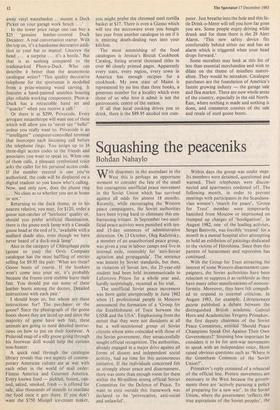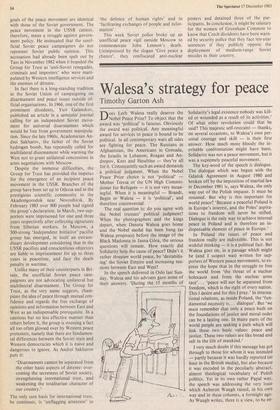Squashing the peaceniks
Bohdan Nahaylo
With disarmers in the ascendant in the West this is perhaps an opportune moment to consider the fate of the small but courageous unofficial peace movement in the Soviet Union which has survived against all odds for almost 18 months. Recently, while encouraging the Western peace campaigners, the Soviet authorities have been trying hard to eliminate this em- barrassing irritant. In September two unof- ficial peace activists were punished with ten- and 15-day sentences of administrative detention. On 13 October, Oleg Radzinsky, a member of an unauthorised peace group, was given a year in labour camps and live in internal exile, ostensibly for 'anti-Soviet agitation and propaganda'. The sentence was lenient by Soviet standards, but then, in violation of Soviet law, the 25-year-old student had been held incommunicado in Lefortovo Prison for a whole year and, hardly surprisingly, recanted at his trial.
The unofficial Soviet peace movement was born quite unexpectedly in June 1982 when 11 professional people in Moscow announced the formation of a 'Group for the Establishment of Trust between the USSR and the USA'. Emphasising from the outset that they were not dissidents at all but a well-intentioned group of Soviet citizens whose aims coincided with those of the Soviet government, they unsuccessfully sought official recognition. The authorities, already engaged in a major drive against all forms of dissent and independent social activity, had no time for this autonomous initiative. If the individuals concerned felt so strongly about peace and disarmament, there was more than enough room for them within the 80-million strong official Soviet Committee for the Defence of Peace. To want to exist outside this framework was declared to be 'provocative, anti-social and unlawful'. Within days the group was under siege. Its members were detained, questioned and warned. Their telephones were discon- nected and apartments cordoned off. The following month, ih order to prevent meetings with participants in the Scandana- vian women's 'march for peace', 'Group for Trust' member were temporarily banished from Moscow or imprisoned on trumped up charges of 'hooliganism'. In August 1982, one of the leading activists, Sergei Batovrin, was forcibly 'treated' for a month in a mental hospital after attempting to hold an exhibition of paintings dedicated to the victims of Hiroshima. Since then this pattern of harassment and repression has continued.
With the Group for Trust attracting the interest of some Western disarmament cam- paigners, the Soviet authorities have been reluctant to suppress it as ruthlessly as they have many other manifestations of noncon- formity. Moreover, they have felt compell- ed to respond to external criticism. In August 1983, for example, Literaturnaya gazers published a debate between the distinguished British academic Gabriel Horn and Academician Yevgeny Primakov, the first deputy chairman of the Soviet Peace Committee, entitled 'Should Peace Champions Speak Out Against Their Own Governments?' Stressing how important he considers it to be for anti-war movements to speak with an independent voice, Horn raised obvious questions such as 'Where is the Greenhorn Common of the Soviet Union?'.
Primakov's reply consisted of a rehearsal of the official line. Protest movements are necessary in the West because the govern- ments there are 'actively pursuing a policy of preparing for a new war'. In the Soviet Union, where the government 'reflects the true aspirations of the Soviet peoples', the goals of the peace movement are identical with those of the Soviet government. The peace movement in the USSR cannot, therefore, mean a struggle against govern- ment policy. He insinuated that the unof- ficial Soviet peace campaigners do not represent Soviet public opinion. This accusation had already been spelt out by Tass in November 1982 when it branded the Group for Trust as 'anti-Soviet renegades, criminals and imposters' who were mani- pulated by Western intelligence services and the enemies of detente.
In fact there is a long-standing tradition in the Soviet Union of campaigning on disarmament and peace issues outside of- ficial organisations. In 1966, one of the first prominent dissidents, Yuri Galanskov, published an article in a samizdat journal calling for an independent Soviet move- ment for universal disarmament which would be free from government manipula- tion. Since the late 1960s, Academician An- drei Sakharov, the father of the Soviet hydrogen bomb, has repeatedly called for multilateral disarmament while warning the West not to grant unilateral concessions in arms negotiations with Moscow.
Despite the immense difficulties, the Group for Trust has provided the impetus for the emergence of an incipient peace movement in the USSR. Branches of the group have been set up in Odessa and in the prestigious scientific community in the Akademgorodok near Novosibirsk. By February 1983 over 900 people had signed the group's declaration. In March, two sup- porters were imprisoned for one and three years respectively after collecting signatures from Siberian workers. In Moscow, a 300-strong 'Independent Initiative' pacifist group has emerged, in itself an extraor- dinary development considering that in the USSR pacifists and conscientious objectors are liable to imprisonment for up to three years in peacetime, and face the death penalty in wartime.
Unlike many of their counterparts in Bri- tain, the unofficial Soviet peace cam- paigners are not advocating unilateral but multilateral disarmament. The Group for Trust, as the very name suggests, cham- pions the idea of peace through mutual con- fidence and regards the free exchange of opinions and information between East and West as an indispensable prerequisite. In a cautious but no less effective manner than others before it, the group is stressing a fact all too often glossed over by Western peace protesters, namely that there are fundamen- tal differences between the Soviet state and Western democracies which it is naive and dangerous to ignore. As Andrei Sakharov puts it: 'Disarmament cannot be separated from the other basic aspects of detente: over- coming the secretness of Soviet society, strengthening international trust, and weakening the totalitarian character of our country.'
The only sure basis for international trust, he continues, is 'unflagging attention' to `the defence of human rights' and to 'facilitating exchanges of people and infor- mation'.
This week Soviet police broke up an unofficial peace vigil outside Moscow to commemorate John Lennon's death. Unimpressed by the slogan 'Give peace a chance', they confiscated anti-nuclear posters and detained three of the par- ticipants. In conclusion, it might be salutary for the women of Greenham Common to know that Czech dissidents have been warn- ed by security police that they face ten-year sentences if they publicly oppose the deployment of medium-range Soviet missiles in their country.







































































 Previous page
Previous page